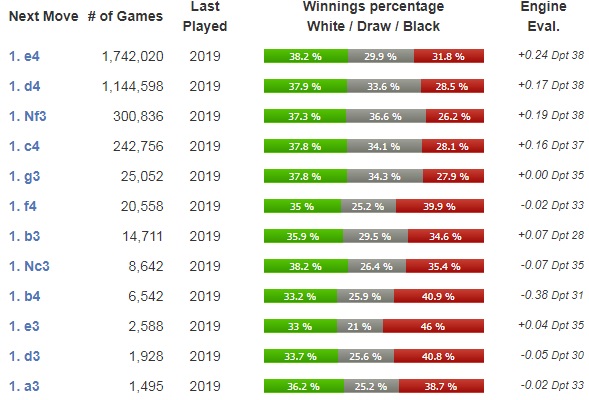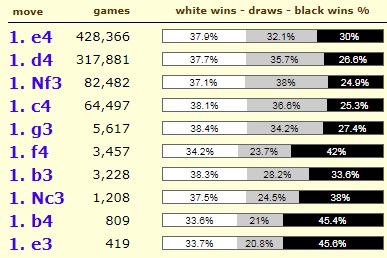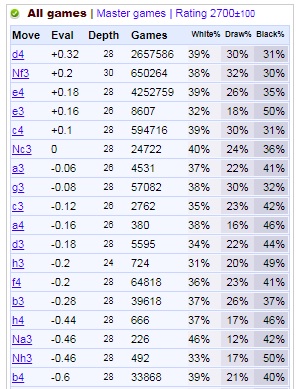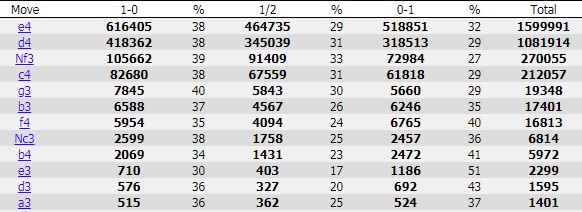Re: Is e4 significantly better than d4?
Posted: Thu Sep 19, 2019 2:40 am
365chess.com database:






I think so too.
Not really. If you are able to have a method to compute the chances of beating a given opponent to an accurate and meaningful percentage, then you can express and objective analysis of what move is better in any position.mwyoung wrote: ↑Sat Sep 21, 2019 3:13 amIt is ridiculous to try and express an objective analysis on what move is better e4 or d4, or any other starting move for white. The understanding in chess is just to deep to give such answers. Even if we pretend that today's chess engines are almost the ultimate in chess understanding which they are not. There is still a unknown as at the starting position there is over 10^120 possible games in the lower bound. If we assume the game ends in 40 moves. And you must remember there is only 3 true evaluations in chess. The move wins, the move draws, or the move is a loss. To give a objective analysis on what move is better just considering e4 or d4. You must show that e4 is a win in every case, and d4 is a loss in every case. To say the e4 is better then d4.
That would be subjective not objective. As you only have limited information and your interpretation. So the best opening move is based on the player, and you feelings of what would be best to play. Again we have no answer to "Is e4 significantly better than d4?" Or any other opening first move for white. Is e4 significantly better than c4?, Is e4 significantly better than Nf3?, Is e4 significantly better than a3?Ovyron wrote: ↑Sun Sep 22, 2019 8:10 pmNot really. If you are able to have a method to compute the chances of beating a given opponent to an accurate and meaningful percentage, then you can express and objective analysis of what move is better in any position.mwyoung wrote: ↑Sat Sep 21, 2019 3:13 amIt is ridiculous to try and express an objective analysis on what move is better e4 or d4, or any other starting move for white. The understanding in chess is just to deep to give such answers. Even if we pretend that today's chess engines are almost the ultimate in chess understanding which they are not. There is still a unknown as at the starting position there is over 10^120 possible games in the lower bound. If we assume the game ends in 40 moves. And you must remember there is only 3 true evaluations in chess. The move wins, the move draws, or the move is a loss. To give a objective analysis on what move is better just considering e4 or d4. You must show that e4 is a win in every case, and d4 is a loss in every case. To say the e4 is better then d4.
Say, you have an opponent before you with a game about to start, you know that against them, you have some 62% chance of winning with 1.e4, and some 58% chance of winning with 1.d4. This is because she loves playing the French against 1.e4 or whatever.
Well, what would constitute the truth about what move is better would be computing those percentages against the strongest possible chess opponent that you can face, because against a lesser opponent your percentages would just increase, so if you're strong enough to beat this strongest opponent with a line, then you can also use this line against the one in the previous paragraph, even if the line starts with 1.d4.
It'd be ridiculous only against perfect play, because then 1.e4 and 1.d4 draw and they're objectively equal, but we don't have perfect play around. Some people disagree with me on this, and say draw death hit us years ago, but those people also claim they can draw a game against all possible moves, including technology from the future, and that's hard to believe.
If every opponent is fallible then you'll have a higher chance of performing better against the strongest opponent you can face with 1.e4 or with 1.d4. The move that has the biggest performance is the best one, objectively (but we don't know which one, and we don't know how to figure it out).
OneTrickPony's method of showing ELO performance is sound, because against a pool that only includes the strongest opponent you'll have some ELO, and the best move will have a higher ELO than the other, so we can approach the problem by having increasingly stronger opponents in the pool providing the move's performances, and extrapolate what we'd expect to see against the strongest possible fallible chess player.
Another way of doing this is getting rid of the garbage, moves are as good as the people that play them, so you can increase accuracy by removing the players with lowest ELO from the pool. You can also remove bad moves from the pool. Like, do you really think the King's Gambit is relevant in deciding what move is the best starting one?
If 2.f4 is a move with a bad ELO performance then you know you shouldn't play it, and that the strongest opponent will not play it, so you can remove the King's Gambit from the calculations. If the French similarly performs badly, it has nothing to do in there, so before calculations you remove all French games.
And so on, until you're left with very tight mainlines played by the strongest players, the ELO performance of 1.e4 and 1.d4 will be much closer to the truth, and it's here that to get deeper you'll have to prune what's left.
Like, what will be the strongest opponent's reply against 1.e4? 1...e5 or 1...c5 ? Which one has the highest ELO performance? Whatever it is, you prune the other one. Hopefully at this point it'll be clear that you prune the one that gives 1.e4 the biggest performance at the root, and the answer is easy.
Perhaps this method sucks at giving the truth about what move is best, but a similar method that does work should exist in theory.